#pierre gilliard
Photo
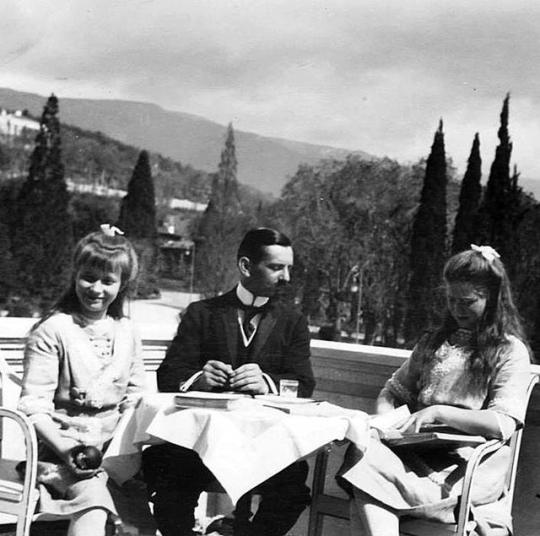
Grand Duchesses Anastasia and Maria with their French tutor Pierre Gilliard, having a lesson on a balcony of the Livadia Palace, 1912
117 notes
·
View notes
Text
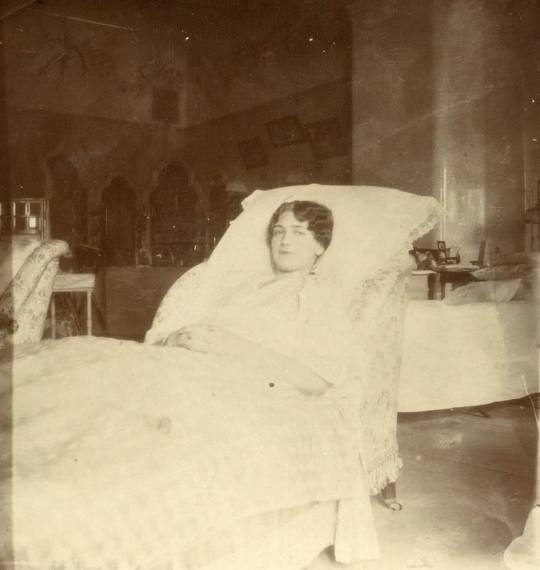
Grand Duchess Maria Nikolaevna in bed recovering from her bout of measles and double pneumonia, spring 1917
❧ “Maria took her turn, who until now was her mother's greatest support. Even in the first stages of her illness, she hoped that she would be able to avoid staying in bed. She intended to endure until her father returned and she begged Baroness Buxhoeveden not to trouble her mother when she also developed a fever. At last, however, her exhausted nature betrayed her very badly. Along with the measles she suffered double pneumonia and reached the gates of death. In her feverish delirium and nightmares, she saw terrible soldiers who came to kill her mother and she shouted in terror, "Crowds of peopl... dreadful people... they re coming to kill Mamma!! Why are they doing these things?" - Romanov Royal Martyrs ☙
❧ “She was now anxious about Marie Nicolaievna on latter had been taken ill much later than her sisters, condition was aggravated by a severe attack of pneumonia of a virulent kind. Her constitution was excellent, but she had all she could do to survive. ☙ - Pierre Gilliard, 13 Years At The Russian Court
❧ “On 19 March I received a note from the Empress that Maria Nikolaevna is dying and asking for me. The messenger told me that Anastasia Nikolevna is also very sick; both had pneumonia, and the latter also became deaf due to the ear infection…I tiptoed to Maria Nikolaevna. She was lying there, white like linen, her eyes, naturally large, seemed even larger, temperature was 40.9, she breathed oxygen. When she saw me, she made some attempts to pick up her head and started to cry, repeat-ing: "Anya, Anya." I stayed with her until she fell asleep.” ☙ - Anna Vyrubova
❧ “Apparently Maria's and Anastasia's illness broks the tamp remained normal; they are weak and slept all day, of cours with breaks.” ☙ - Tsar Nicholas II diary entry, March 20th 1917
#maria nikolaevna#captivity#1917#quotes#letters and diaries#grand duchess maria#grand duchess maria nikolaevna#romanovs#romanov#russian history#russian imperial family#measles#house arrest#otma#otmaa#tsar nicholas ii#anna vyrubova#pierre gilliard#13 years at the Russian court#favs
88 notes
·
View notes
Text

#Grand Duchess Olga Nikolaevna#Grand Duchess Tatiana Nikolaevna#Pierre Gilliard#colorization#1910s#Romanov#Russia
28 notes
·
View notes
Text
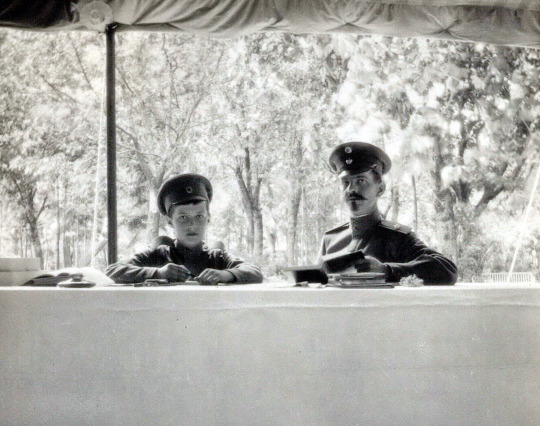
Tsarevitch Alexei Nikoleavich Romanov with his french tutor Pierre Gilliard. Both making very serious facial expressions.
20 notes
·
View notes
Text

Alexei Nikolaevich, Pierre Gilliard and Kolya Derevenko on the porch of the governor's house in Tobolsk, 1918
19 notes
·
View notes
Text
Myth-busting - did sailor nanny Derevenko betray the family?
Several members of the imperial entourage have been villainised over the decades, none more than Andrei Eremevich Derevenko, whom Anna Vyrubova claimed in her memoir to have betrayed the family. Many historians in the 20th century took this as fact, but more evidence has shown that it is highly likely that Derevenko did not betray the family or Alexei, and fell victim to one of the many lies in Anna Vyrubova's book. Some popular history books go as far as calling him 'abusive' - but let's look at the real facts.
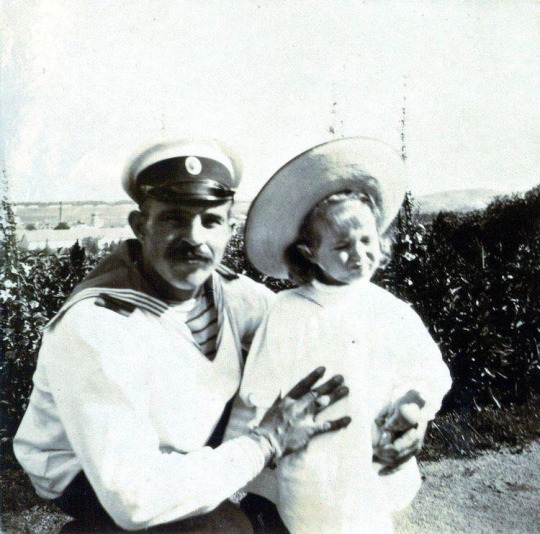
Andrei Eremevich Derevenko was born in 1878, in Volyn, Zhytomr, in the Ukraine. He was a member of the baltic fleet, originally a sailor before being employed by the Imperial Family. In May 1906 he was appointed as the Dyadka, meaning 'uncle', to Tsarevich Alexei Nikolaevich. Derevenko was a sailor nanny, his primary role was to look after Alexei, and to ensure that the haemophilliac did not do himself an injury.
Derevenko found himself in more favour with the family in 1907, when his actions during a collision of the yacht Standart with a large rock were seen as admirable. His experience as a sailor came in incredibly handy; he knew that the boiler rooms of the ship were most likely to sink first, so grabbed the tiny Heir and ran to the opposite side of the ship, ensuring the Tsarevich's maximum safety.
In 1910, he was paid 120 rubles a year annually. By 1913, this had increased to 360 a year. Derevenko was joined by another sailor nanny, Klimenty Grigorievich Nagorny, in 1913 to help protect the heir as he grew into a rambunctious boy. The Tsarevich especially enjoyed playing with Derevenko's sons, Sergei, Alexei, and possibly a third, Alexander. The Tsarina were the children's godmother, and in turn the Tsar and Tsarina paid yearly expenses for the boy's education, and covered the cost of a surgery one of them underwent. Derevenko kept a daily diary, where he mostly recorded the duties he performed for Alexei, and what they both got up to during the day.


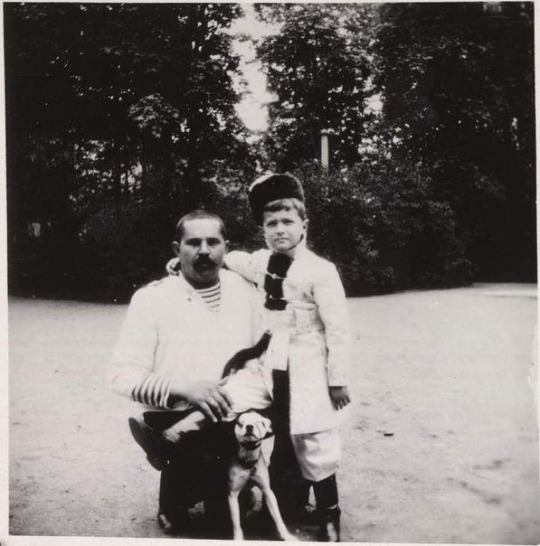
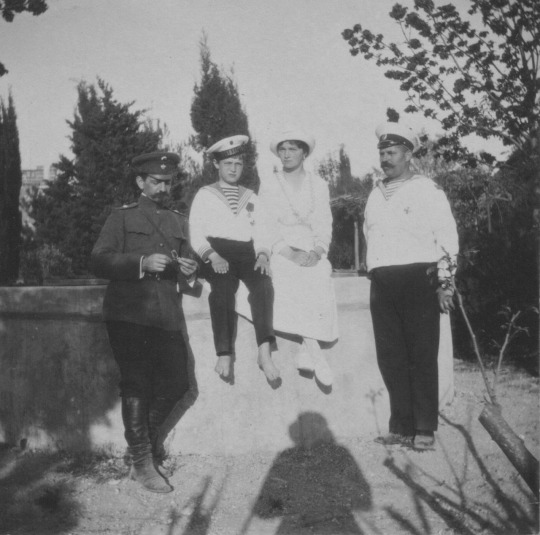
Now we come on to the origin of the myth. In her memoir, Anna Vyrbova claimed that after the February Revolution, she discovered:
"Lying sprawled in a chair was the sailor Derevenko, for many years the personal attendant of the Tsarevitch, and on whom the family had bestowed every kindness, every material benefit. Bitten by the mania of revolution, this man was now displaying his gratitude for all their favors. Insolently he bawled at the boy whom he had formerly loved and cherished, to bring him this or that, to perform any menial service his mean lackey's brain could think of. Dazed and apparently only half conscious of what he was being forced to do, the child moved about trying to obey. It was too much to bear."
Anna Vyrubova was arrested in March 1917, and did not spend the following months with the family at the Alexander Palace. She claims that this event happened on 20 March 1917. In contrast, family photo albums show that Derevenko was still a part of the retinue until the day of departure to Tobolsk, and was actually promoted in July 1917 by the Tsar to the role of Alexei's official valet.

Historian Charlotte Zeepvat proposes another explanation:
One of the most enigmatic figures, and the most intimately involved with Alexei, was the sailor Derevenko. Anna Virubova claimed to have seen Derevenko bullying Alexei, shouting orders at a boy too bemused to fight back. If this is true it would have been a shattering experience, but its truth is not so clear cut as it may seem. According to Anna, it happened on 20 March, two days before her own arrest. After a display like that the sailor would surely have left or been made to go, but he was still at the palace months later. Shortly before the move to Tobolsk in August he submitted an invoice for new clothes and shoes for Alexei to Colonel Kobilinski, the commandant of the palace garrison. He was asking a huge amount, so payment was withheld: when the sailor complained to the Tsaritsa and she intervened on his behalf, Kobilinski showed her the invoice. She took the Colonel's part. Derevenko was refused permission to accompany the family to Tobolsk, but months after their departure, he was still pleading to be allowed to join them. Failing that, he asked for the return of a trunk, which he said had gone to Tobolsk in error. It was found and opened, and inside were the new clothes and shoes, and an icon given to Alexei by his great-uncle, Grand Prince Sergei Alexandrovich. Was Derevenko stealing? Looking after the boy's interests in his own peculiar way? No one will ever know.
Several letters sent by Derevenko have survived. In the letters, he explains that the commissioners at the Alexander Palace and Tobolsk had informed him that there was 'no space' to take him on the trip, and that he was awaiting summons to Tobolsk, should he be required. Interestingly, these letters detail that the other sailor nanny, Nagorny, stayed in contact with Derevenko, and he also reveals that he was receiving multiple letters from the family and retinue from Tobolsk.
Historian George Hawkins, who has translated all of Alexei's correspondence and diaries from 1905-1918, found an interesting account by Comissar Pankratov. In this account, he explains that Colonel Kobylinski was confronted by Alexandra Feodorovna when Derevenko was not on the list, though was embarrassed when she discovered that he had requested a disproportionately high invoice to the Provisional Government for his duties. Pakratov added that Derevenko wrote to him repeatedly asking "when would he be called to Tobolsk to continue his official duties with the “heir”."
George Hawkins summarises: "Going by this account, it would seem he didn't [betray the Imperial Family]. Ania Vyrubova is the ultimate source for his 'betrayal' where she wrote that he started ordering Alexei about. I think something like that may well have happened, as it is also reported by Sokolov in his investigation into the fate of the Romanovs, but it would seem he still stayed with the family until their departure to Tobolsk - trying to get extra money out of the provisional government with his exaggerated bill, and kept trying to get to Tobolsk for some time."
The exact fate of Derevenko is unknown. Some sources suggest that he joined the White Army and died in 1921, either from being wounded/killed in action or succumbing to an illness. The early 1920s were years of intense turmoil and civil war in Russia, so it is not unusual that his documents drop off the record.
Though we can conclude that Derevenko did not betray the family in that he was 'abusive' to Alexei, he was not exactly popular with the suite. Pierre Gilliard recalled in his memoirs 'Thirteen Years at the Russian Court' that Derevenko preferred peasants to:
"[drop to their] knees before Alexis Nicolaïevitch to offer him what they had brought. I noticed that the boy was embarrassed and blushed violently, and when we were alone I asked him whether he liked seeing people on their knees before him.
"Oh no, but Derevenko says it must be so !".
Gilliard also believes that the sailor nannies stifled Alexei's progress too much, and did not allow him to test the boundaries of his disease in order to become more self-disciplined.

Sources:
Memories of the Russian Court - Anna Vyrubova
Romanov Autumn - Charlotte Zeepvat
Russian Imperial Family: Romanovs in Their Own Words - Helen Azar and George Hawkins
Expenses of Alexey - Alexander Palace Org
Alexei - Russia's Last Tsesarevich: Letters, diaries and writings Part One: 1904 – 1915 - George Hawkins
Alexei - Russia's Last Tsesarevich: Letters, diaries and writings Part Two: 1916-1918 - George Hawkins
Photos:
Public domain, flickr - LastRomanovs
#myth busting#Romanovs#Alexei Nikolaevich#Tsarevich Alexei#myths#my own#Andrei Derevenko#Pierre Gilliard#Derevenko#Dyadkas#Nagorny#Klimenty Nagorny#russian history#romanov family#Anna Vyrubova#sources
37 notes
·
View notes
Text

OTMA posing with their newly shaved heads, Tsarskoe Selo, June 1917
“As the Grand-Duchesses were losing all their hair as the result of their illness, their heads have been shaved. When they go out in the park they wear scarves arranged so as to conceal the fact. Just as I was going to take their photographs, at a sign from Olga Nicolaievna they all suddenly removed their headdress. I protested, but they insisted, much amused at the idea of seeing themselves photographed like this, and looking forward to seeing the indignant surprise of their parents. Their good spirits reappear from time to time in spite of everything. It is their exuberant youth.”
— Diary entry of French tutor Pierre Gilliard, June 22nd 1917
(Source: 13 Years at the Russian Court by Pierre Gilliard)
#OMGGGGGGG 🤩#I AM SO HAPPY I FOUND THIS!#YAYAYAYAYAYAYYYY#🩷🤍#now we understand the amazingness of this photo!#and we see how silly the girls were!#WHAT A FIND! ⭐️#otma#olga nikolaevna#tatiana nikolaevna#maria nikolaevna#anastasia nikolaevna#romanovs#romanov#captivity#pierre gilliard#letters and diaries#quotes#so rare!#tsarskoe selo#1917#house arrest#13 years at the Russian court
25 notes
·
View notes
Text


Anastasia holding her little friend jimmy with Alexei , Pierre Gilliard and an officer driving the Peugeot Bebe near the white tower in the Alexander park , Tsarskoye Selo 1915.
@sledstvie
#anastasia nikolaevna#alexei nikolaevich#pierre gilliard#alexander park#tsarskoe selo#1915#grand duchess anastasia#anastasia romanov#tsarevich alexei#romanovs#russian empire
38 notes
·
View notes
Text
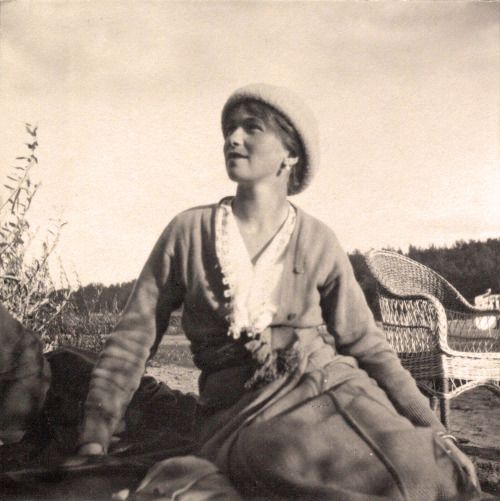

The eldest, Olga Nicolaievna, possessed a remarkably quick brain She had good reasoning powers as well as initiative, a very independent manner, and a gift for swift and entertaining repartee. She gave me a certain amount of trouble at first, but our early skirmishes were soon succeeded by relations of frank cordiality.
She picked up everything extremely quickly, and always managed to give an original turn to what she learned. I well remember how, in one of our first grammar lessons, when I was explaining the formation of the verbs and the use of the auxiliaries, she suddenly interrupted me with:
"I see, monsieur. The auxiliaries are the servants of the verbs It's only poor 'avoir' which has to shift for itself."
She read a good deal apart from her lessons. When she grew older, every time I gave her a book I was very careful to indicate by notes in the margin the passages or chapters she was to leave out. I used to give her a summary of these. The reason I put forward was the difficulty of the text or the fact' that it was uninteresting.
An omission of mine cost me one of the most unpleasant moments in my professional career, but, thanks to the Tsar's presence of mind, the incident ended better than I could have hoped.
Olga Nicolaievna was reading "Les Miserables," and had reached the description of the battle of Waterloo. At the beginning of the letter she handed me a list of the words she had not understood, in accordance with our practice. What was my astonishment to see in it the word which is forever associated with the name of the officer who commanded the Guard. I felt certain I had not forgotten my usual precautions. I asked for the book to verify my marginal note, and realised my omission. To avoid a delicate explanation I struck out the wretched word and handed back the list to the Grand-Duchess.
She cried, "Why, you've struck out the word I asked papa about yesterday I"
I could not have been more thunderstruck if the bolt had fallen at my feet.
"What! You asked your...
"Yes, and he asked me how I'd heard of it, and then said it was a very strong word which must not be repeated, though in the mouth of that general it was the finest word in the French language."
A few hours later I met the Tsar when I was out walking in the park. He took me on one side and said in a very serious tone.
"You are teaching my daughters a very curious vocabulary, monsieur. . . . "
I floundered in a most involved explanation. But the Tsar burst out laughing, and interrupted:
"Don't worry, monsieur. I quite realised what happened so I told my daughter that the word was one of the French "army's greatest claims to fame."
10 notes
·
View notes
Photo
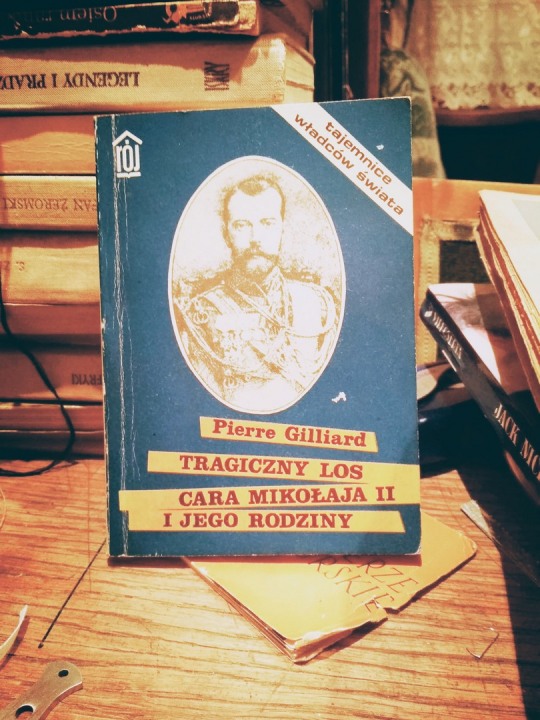
Pierre Gilliard - Tragiczny los cara Mikołaja II
#Pierre Gilliard#Tragiczny los cara Mikołaja II#1990#książki#books#czytanie#literatura#górna półka dziadków#rój
0 notes
Text









Grand Duchess Anastasia Nikolaevna Romanova
❈ “We swung on the swing; boy, did I laugh when I fell off so splendidly!” ◦ “I took this picture of myself looking at the mirror. It was very hard as my hands were trembling.” ◦ “Goodbye. Don’t forget me.” • Anastasia (various sources)
❈ “My favorite goddaughter was she indeed! I liked her fearlessness. She was a fearful tomboy. And what a bundle of mischief!” • Grand Duchess Olga Alexandrovna
❈ “Anastasia Nicolaevna was the originator of all mischief, and was as witty and amusing as she was lazy at her lessons. She was quick and observant, with a keen sense of humour, and was the only one of the sisters who never knew the meaning of shyness. Even as a baby she had entertained grave old men, who were her neighbors at table, with her astonishing remarks.” • Baroness Sophie Buxhoeveden
❈ “Her French accent was excellent, and she acted scenes from comedy with remarkable talent. ... Ingenuousness and utter simplicity were the most characteristic qualities of Anastasia Nicolaievna. She was the imp of the whole house, and the glummest faces would always brighten in her presence, for it was impossible to resist her jokes and nonsense. [S]he was aflame with life and animation.” • Pierre Gilliard
❈ “The youngest Grand Duchess might have been composed of quicksilver, instead of flesh and blood; she was most amusing, and she was a very clever mimic. She saw the humorous side of everything, and she was very fond of acting.” • Lili Dehn
#historicwomendaily#anastasia nikolaevna#historyedit#anastasia#anastasia romanov#romanov#otma#russian history#imperial russia#grand duchess anastasia nikolaevna#women's history#women in history#romanov dynasty#twentieth century#well I don't love it and it's late BUT. finally done!#a whole year later lol#now I might redo maria's bc it's my least fave
150 notes
·
View notes
Text
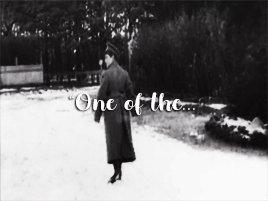
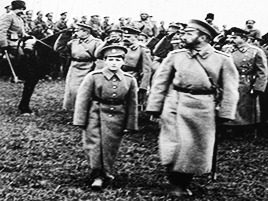
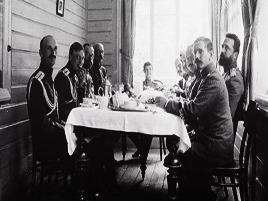

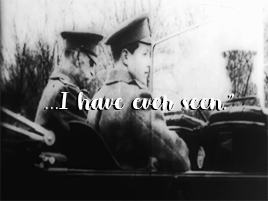
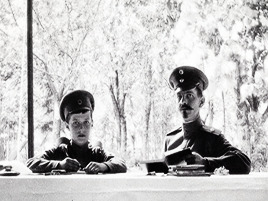
"Since the outbreak of war Alexey had been playing soldiers at home, proudly strutting around in his soldier's greatcoat - 'quite like a little military man', as Alix told Nicky - standing guard, digging trenches and fortifications in the palace gardens with his dyadki and in the process sometimes provoking attacks of pain in his arms. But aside from this he was in better health than he had been for years, and for some time now had had no serious attacks. It was hard for Alexandra to let her boy go, but she agreed on condition that Alexey's studies should not be interrupted. He was by now, however, woefully behind in his lessons and although he was followed to Stavka by both PVP and Pierre Gilliard, he rarely knuckled down to a full day's lessons, preferring the distractions of board games, playing his balalaika and enjoying the company of his new dog, a cocker spaniel named Joy. At Stavka Alexey was in his element, sharing the same Spartan living conditions with his father, sleeping on campbeds, going on trips to army camps, inspecting the troops with him and enjoying the camaraderie of the soldiers, and taking particular pleasure in swimming with his father in the River Dnieper. Back at Tsarskoe everyone in the entourage felt the absence of father and son: "life at the Imperial Palace became, if possible, even quieter", recalled Iza Buxhoeveden. "The whole place seemed dead. There was no movement in the great courtyard. We ladies-in-waiting went to the Empress through a series of empty halls." Whenever Nicholas and Alexey returned on visits, "the palace sprang to life". At Stavka the young heir made a strong impression on all who met him. True, he could still be brattish - particularly at table, where he had a penchant for throwing pellets of bread at his father's ADCs. But his extraordinary energy lit up a room. "It was the first time I had seen the Tsarevich when the door of our box flung open and he came like a gale of wind," recalled US naval attaché Newton McCully:
"Full of life, healthy looking, and one of the handsomest youngsters I have ever seen, I was particularly glad to see him so closely because I had heard so many rumors about his being paralyzed - maimed for life - and so on. One could not wish to see a handsomer child. Undoubtedly he has been ill, but there are no signs of illness about him now - if anything perhaps a too exuberant vitality, perhaps an organism over-nervous."
In mid-october, Alexandra, Anna Vyrubova and the girls visited Mogilev, in time to see Alexey awarded the Medal of St George 4th class. They were all delighted to see the continuing improvement in his health and strength. "He was developing marvelously through the summer both in bodily vigor and gaiety of spirits", recalled Anna Vyrubova. "With his tutors, M. Gilliard and Petrov, he romped and played as though illness were a thing to him unknown.""
The Romanov Sisters | Helen Rappaport.
#tsarevich alexei#alexei nikolaevich#my own#tsarevich#my edits#facts#romanovs#tsar nicholas ii#nicholas romanov#tsar#wwi#russian imperial family#xx century#my gif
87 notes
·
View notes
Text


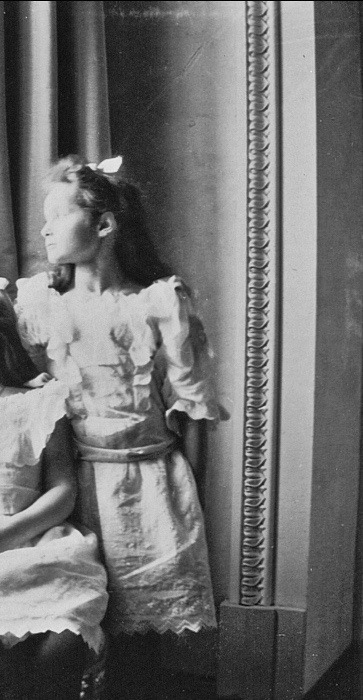
Pierre Gillard, describing his first impressions of the eldest daughters of Nicholas II, whom he met in 1905:
L’aînée des grandes-duchesses, Olga, fillette de dix ans, très blonde, yeux pétillants de malice, nez légèrement relevé, m’examinait avec un regard qui semblait chercher dès la première minute le défaut de la cuirasse, mais il se dégageait de cette enfant une impression de pureté et de franchise qui vous la rendait de prime abord sympathique.
La seconde, Tatiana, âgée de huit ans et demi, aux cheveux châtains, était plus jolie que sa sœur mais donnait l’impression de moins d’ouverture, de franchise et de spontanéité.
Trans:
The eldest of the grand duchesses, Olga, was a child of ten years. Quite blonde, eyes sparkling with malice, her nose delicately lifted, she examined me with a gaze which seemed to be searching, from the very beginning, for even the smallest of faults. Yet there was an impression of purity and of frankness from this child, which rendered her immediately agreeable.
The second daughter, Tatiana, aged eight and a half, with chestnut hair, was prettier than her sister. Yet she gave the impression of less openness, less frankness, and less spontaneity.
Quote: Treize Années à la cour de Russie (trans: Thirteen Years at the Russian Court) by Pierre Gilliard (translated by me).
Photo source: x
#romanov#olga nikolaevna#tatiana nikolaevna#otma#russian history#imperial russia#20th century#royalty#quote#sorry if the translation is a bit weird I rarely translate#mine
124 notes
·
View notes
Text
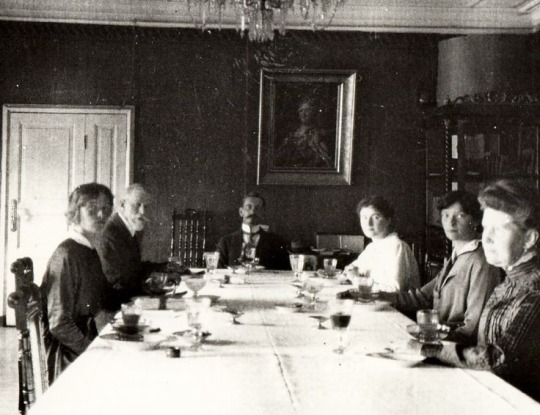
Grand Duchess Olga, Ilya Tatishchev, Pierre Gilliard, Anastasia Hendrikova, Grand Duchess Tatiana and Catherine Schneider in Tobolsk, 1918
#olga nikolaevna#tatiana nikolaevna#Anastasia Hendrikova#Ilya Tatishchev#Catherine Schneider#Pierre Gilliard#tobolsk#1918
37 notes
·
View notes
Text
Recollection of Pierre Gilliard of the Ipatiev House, when he entered the basement just days after the murders
"I then went to the lower storey, the greater part of which was a basement. I entered with intense emotion the room in which, perhaps, they had died. Its aspect was most sinister. Daylight came in through a window with iron bars across it. The walls and the floor bore marks of bullets and bayonet thrusts. It was quite obvious that a dreadful crime had been committed there, and that several people had been killed.
In my despair believed that the Emperor had perished, and, that being the case, I could not believe the Empress had survived him. I had seen her at Tobolsk, when Yakovlev had come to fetch the Emperor, fling herself in the most dangerous place, I had seen her after several hours of agony, when her feelings as a wife and a mother had had a desperate struggle, end by leaving her sick child, though it tore her heart in two, in order to follow her husband, whose life she thought was threatened.
Yes, it was quite possible that they had both been killed. And the children? Had they also been massacred? I could not believe it. The idea was too horrible. And yet everything seemed to prove that the victims had been numerous."
SOURCE: The Crime of Ekaterinburg, Illustrated London News - Saturday, 1 January, 1921
PHOTO: The basement in Ipatiev House, taken for the Sokolov Report, shortly after the murders. A high quality version of this photograph is reproduced in Last Diary of the Tsarina.

#old newspapers#Pierre Gilliard#Ekaterinburg#Sources#Ipatiev House#Romanovs#Romanov family#Russian history#my own
52 notes
·
View notes
Note
heyyy! :) which photos of the last romanovs do you consider extremely rare?
Hi! I have a few answers for this one!
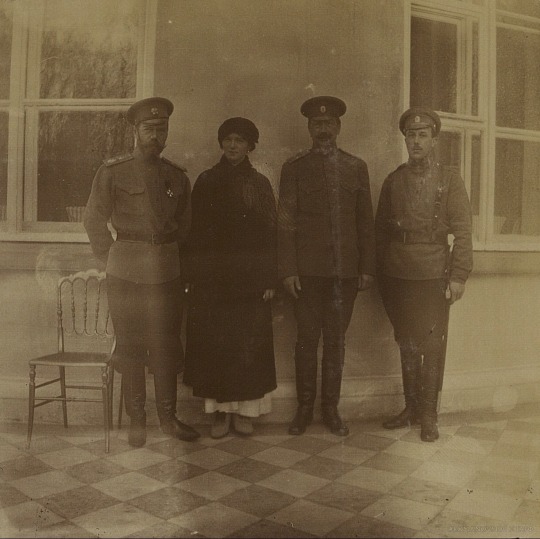
Olga Nikolaevna with her father and officers at Tsarskoe Selo 1917

Alexei Nikolaevich which Pierre Gilliard at Tsarskoe Selo 1917
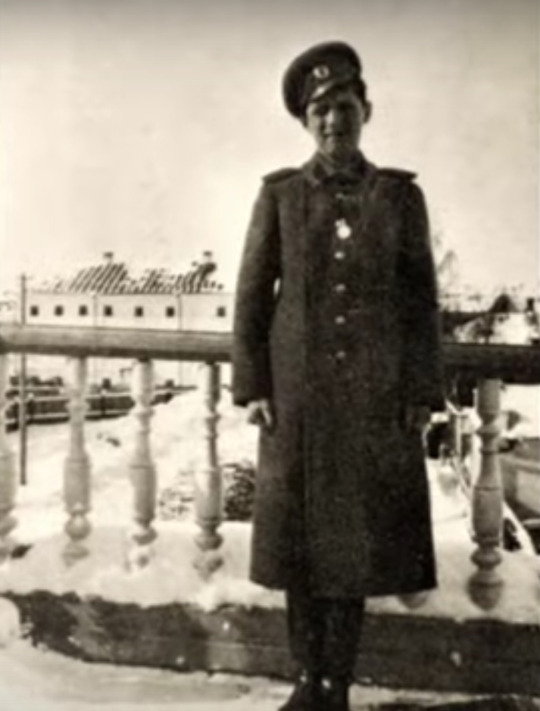
Alexei Nikolaevich at Tobolsk 1918

Tatiana Nikolaevna and Tsar Nicholas II at Tobolsk 1918

Tsar Nicholas II with Anastasia Nikolaevna at Tsarskoe Selo 1917
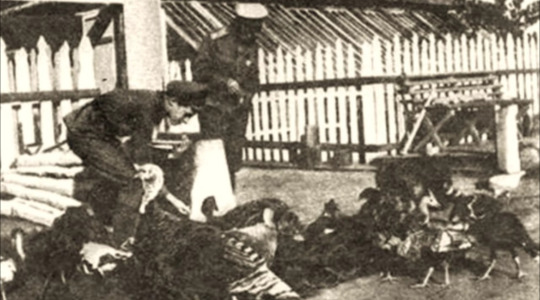
Tsar Nicholas II and Alexei Nikolaevich at Tobolsk 1918
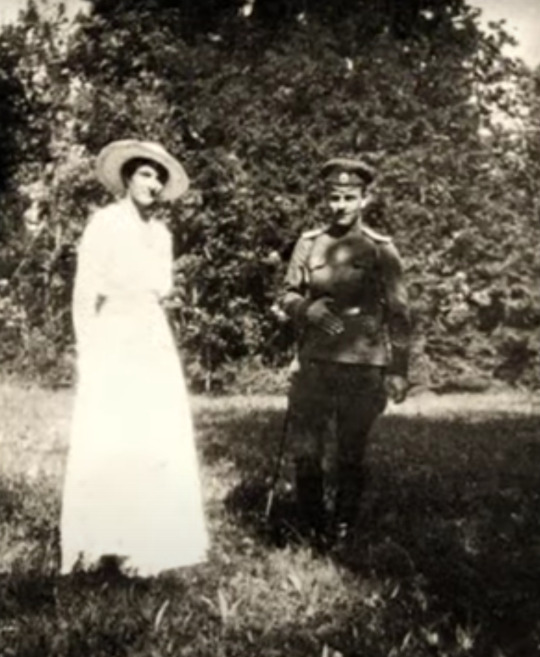

Tatiana Nikolaevna with officers at Tsarskoe Selo 1917

Olga Nikolaevna, Alexei Nikolaevich and Anastasia Nikolaevna at Tobolsk 1918
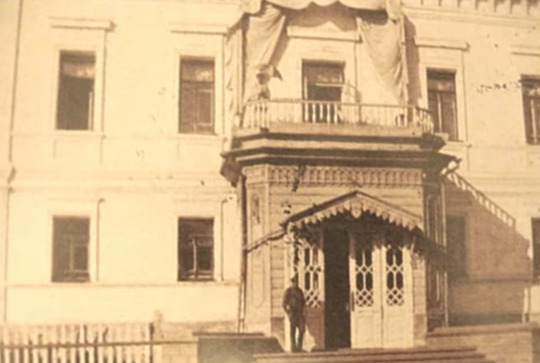
Alexandra Feodorovna at Tobolsk 1918
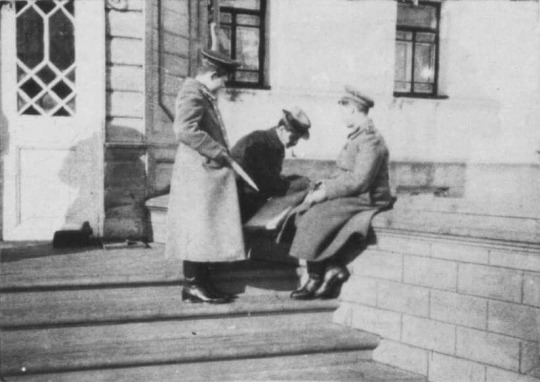
Alexei Nikolaevich with Pierre Gilliard and another boy at Tobolsk 1918
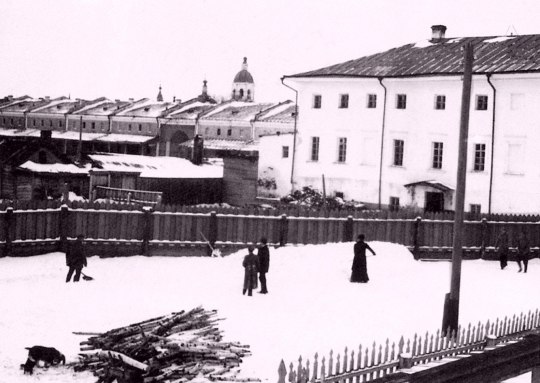
Alexei Nikolaevich, Tsar Nicholas II and Tatiana Nikolaevna at Tobolsk 1918

Tatiana Nikolaevna and Anastasia Nikolaevna at Tsarskoe Selo 1917
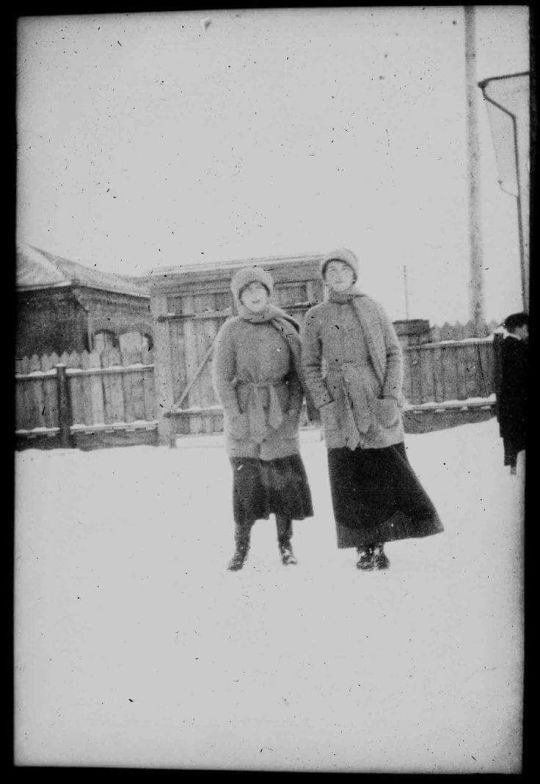
Anastasia Nikolaevna and Olga Nikolaevna at Tobolsk 1918

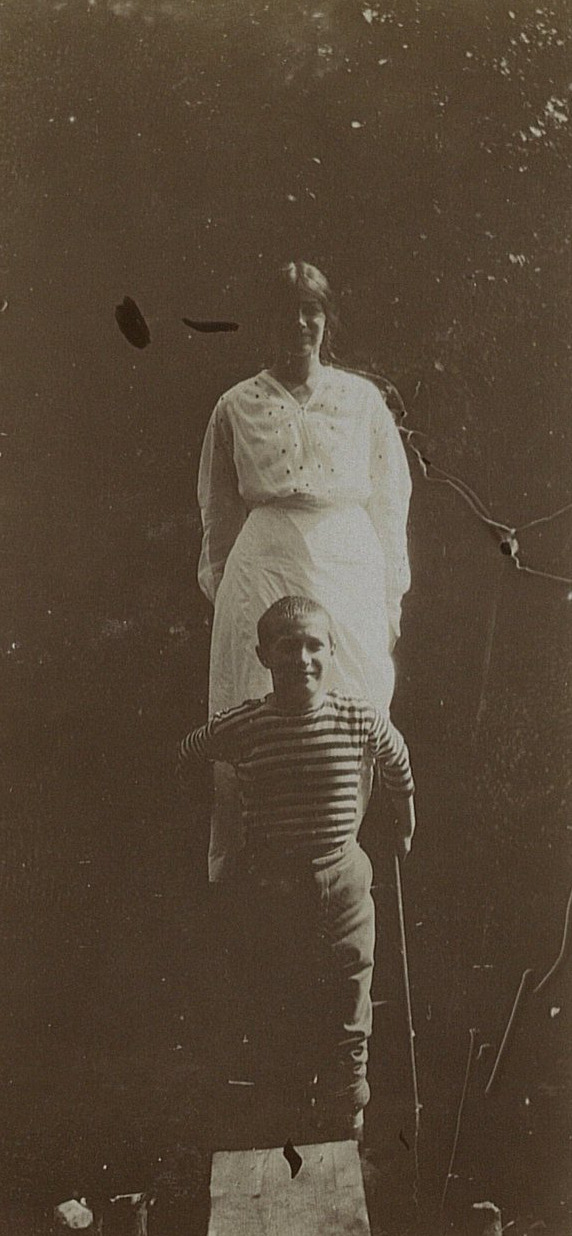
Olga and Maria Nikolaevna with Alexei Nikolaevich at Tsarskoe Selo 1917

Anastasia Nikolaevna, Olga Nikolaevna and Tatiana Nikolaevna at Tobolsk 1918
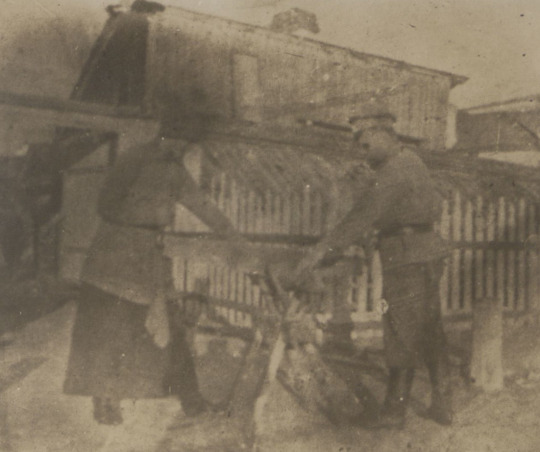
One of the daughters of Tsar Nicholas II with an officer at Tobolsk 1918

Tsar Nicholas II, Alexandra Feodorovna, and Maria Nikolaevna waiting in the carriage that would take them to Yekaterinburg 1918
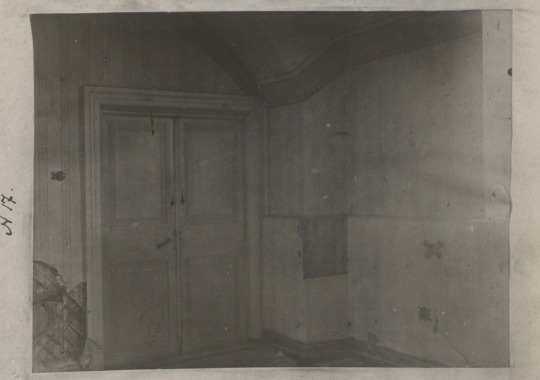
A rare photo of the side of the room that the Romanovs got executed in
thank you for asking me questions!!
37 notes
·
View notes